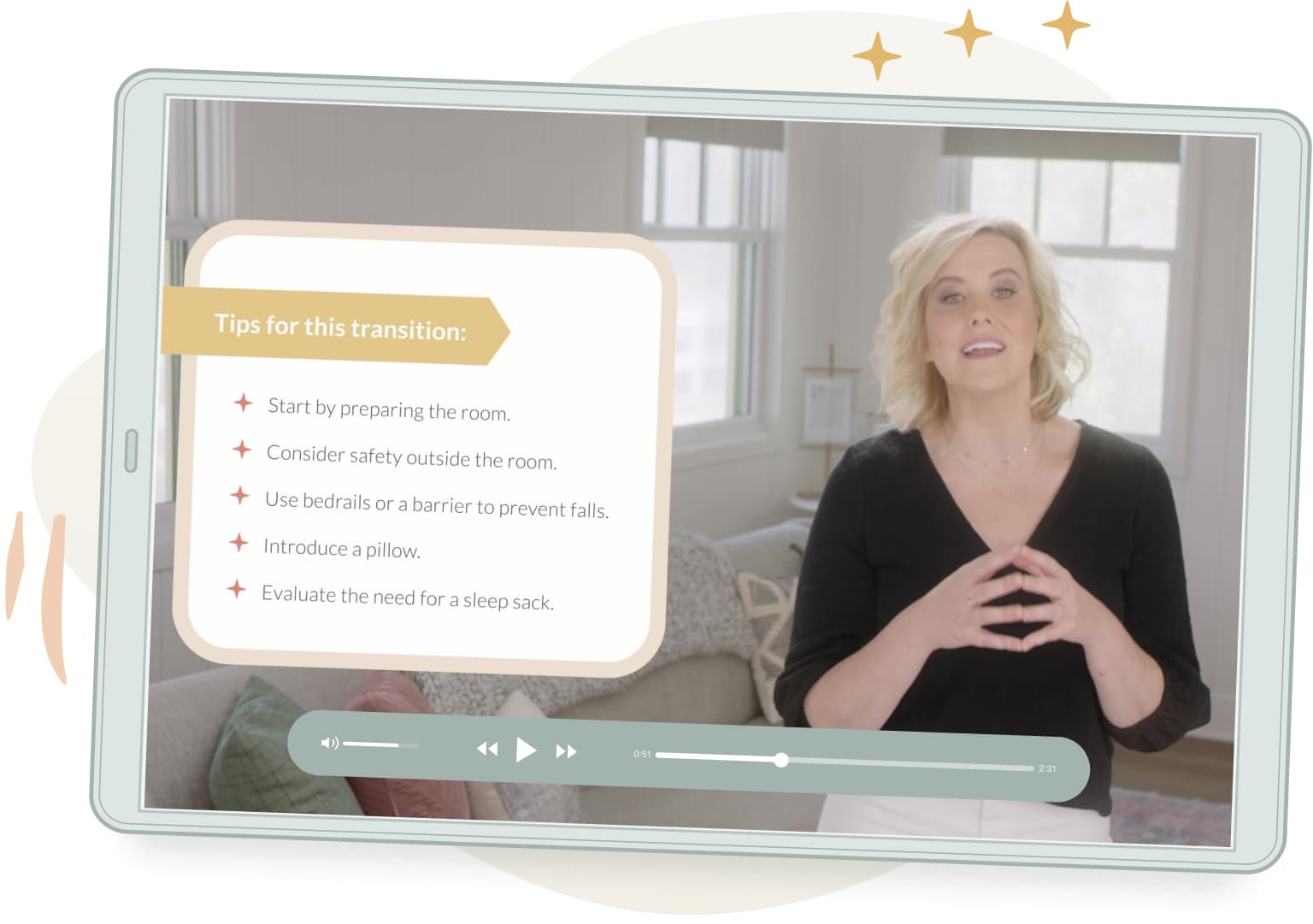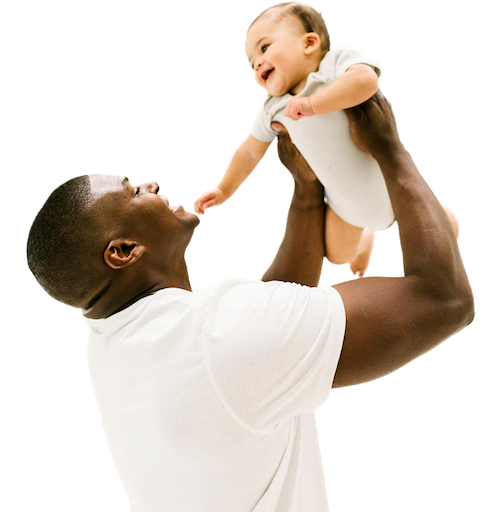Three year olds can keep you on your toes. They have big emotions, a desire for independence, are full of energy, and are ready for action. It can seem like every day they are learning (or trying) something new. All of those big changes can sometimes make it feel like sleep is taking a backseat. This is what we refer to as the 3 year old sleep regression. I’m here to answer your questions and help guide you through it.

Toddler Sleep Training
stars ( reviews)
Wishing you had a step-by-step plan for your toddler’s sleep? My Toddler Sleep Training class will walk you through a customizable approach to sleep while remaining emotionally connected to your toddler. I’ll teach you how to achieve independent nights and consistent naps or quiet times while having the confidence to handle bedtime battles, regressions, new stages, big transitions, and more.
Learn MoreWhat is a sleep regression? anchor
When a little one’s sleep becomes disrupted, many people refer to this as a sleep regression. Sleep regressions are often associated with developmental progression. When toddlers experience growth (physical, mental, emotional), sleep can be impacted. Their brains and bodies are working hard!
Are sleep regressions based in science?anchor
When a little one’s brain is busy learning new things or developing, sleep can take a back seat.(1,2) Also, as children grow, their sleep needs change.(3,4,5) This means a little one may begin to struggle with more night wakings, with nap refusals, and with falling asleep. When sleep is interrupted this way, it can feel like everything is moving backwards, hence the term “sleep regression.”
However, sleep isn’t actually going backwards or permanently “regressing.” Sleep skills don’t just disappear at magical ages. When I talk about common sleep regression ages, I’m talking about ages when babies and toddlers often experience periods of development (physical, cognitive, social) or commonly have a change in sleep needs (Think fewer naps, more awake time, etc..). But truly, all babies develop at their own pace, meaning sleep could be interrupted because of new skills, cognitive progressions, or physical shifts at any age.
Is there a sleep regression at 3 years or 3.5 years? anchor
Yes! It’s possible to see a disruption in sleep around 3 or 3.5 years. You may have noticed a change in your toddler’s sleep, like your 3 year old waking up at night, taking hours to fall asleep, or refusing naps. The appearance or reappearance of these sleep struggles when sleep was going well is referred to as the 3 year old sleep regression.
What are some signs of the 3 year old sleep regression? anchor
Here are some signs of the 3 year old sleep regression. Your 3 year old: anchor
wakes up crying several times a night – either a reappearance of night wakings or increased frequency of night wakings.
takes hours to fall asleep.
won’t nap but is miserable without a nap.
has shorter and/or more disrupted naps than before.
wakes early in the morning – these early mornings either reappear when they were previously resolved, or they become a new issue.
fights sleep at bedtime or nap time – maybe there is a significant change or increase in protest (like crying or calling out for you) or they’re thinking of all the ways they can stall during a wind-down routine.
A note about night terrors in toddlers: anchor
Some parents wonder if their 3 year old waking up crying is due to a night terror. Night terrors usually happen in the first half of the night and you may see your child: screaming, thrashing around, sweating, confused, and/or with open, glassy eyes. During a night terror, your child is still completely asleep. They’re not aware it’s happening and will not likely be able to remember anything about it. Night terrors in toddlers are truly much more scary for you as a parent than for your child.
If you're concerned that you might be seeing nightmares or night terrors, check out my blog My Child is Afraid of the Dark and be sure to talk with your pediatrician.
What causes the 3 year old sleep regression? anchor
Sleep regressions are typically related to developmental progression. Sleep can become tricky when your 3 year old’s brain and body are busy focusing on physical, mental, social, or emotional growth. There are a lot of new skills and developmental strides happening at this age that can impact sleep and contribute to the 3 year old sleep regression.
At 3 years old, we typically see developmental strides like:
Improving gross and fine motor skills.
Increasing language, memory, and creativity.
Expanding imagination (which may result in new fears).
Growing interest in pretend play and imitation.
Increasing desire for independence and understanding the impact of their voice.
Around this age, we can also see a peak in separation anxiety that usually decreases as your child gets closer to age 4. Separation anxiety can look like your independent toddler seeming just fine without you and then suddenly having days (or weeks) where they want you close by. Sleep can be disrupted when a child is experiencing separation anxiety.
Some big life adjustments can also happen around the time a child is 3 or 3.5 years old: potty training, starting preschool, transitioning out of the crib, or adding a new sibling to the family. It’s normal for sleep to be impacted during these transitions, but there are steps you can take to prevent ongoing sleep struggles.
How long does the 3 year old sleep regression last? anchor
Sleep regressions can last a few days to several weeks. When changes in sleep are related to developmental progression, the effects can be temporary. Consistency is the key to helping the 3 year old sleep regression pass more quickly.
I know it can be hard when you’re getting less sleep, but remaining consistent with routines and holding firm to boundaries can be so helpful for making it through the 3 year old sleep regression. When we introduce new habits during a regression, a temporary setback can become a long-term struggle. If sleep has always been tough or you'd like more step-by-step guidance for your days and nights, my Toddler Sleep Training class will give you everything you need to confidently set your toddler up for restful and independent sleep, even during a sleep regression.
My 3 year old won’t nap, is that a sign of a sleep regression? anchor
It could be! Short naps, nap protests, and nap refusals are common signs of sleep regressions.
Let’s talk about some other reasons your 3 year old might refuse a nap that they actually need:
Wake windows are too short (Aim for about 6 hours before the nap.).
Your toddler needs more time to wind down before napping.
Screen time or food are too close to nap time.
The sleep environment needs to be adjusted.
Stimulating toys need to be removed from their room during nap time.
If your 3 year old won’t nap but is miserable, don’t rush to drop the nap just yet. A 3 year old refusing to nap can be a sign of the 3 year old sleep regression and not necessarily a sign that they’re ready to stop napping. Follow my tips for helping your 3 year old through a sleep regression.
Are you ready to end nap battles and get your toddler the rest that they need? My Toddler Sleep Training class is here for you. I’ll give you a step-by-step, customizable plan to set your days up for nap success, handle nap protests, and transition to quiet time when they’re ready.
Is it ok to let my 3 year old cry to sleep during a sleep regression? anchor
When it feels like sleep is falling apart, you may feel like the only option is to simply let your toddler cry. Let me reassure you: You can have a plan to confidently help your toddler sleep independently while remaining emotionally connected and limiting tears.

Toddler Sleep Training
stars ( reviews)
In my Toddler Sleep Training class, I'll walk you step-by-step through a fully-customizable approach to independent sleep for your 3 year old. It doesn't mean that your toddler won't cry at all, but it does mean that you'll do everything you can to minimize tears, prepare your toddler for sleep, and walk alongside them every step of the way.
Learn MoreHow can I help my 3 year old get through a sleep regression? anchor
Whenever a child has a sudden change in their sleep, we want to be sure to rule out any physical concerns, like illness or discomfort. If your 3 year old is healthy and comfortable, here are some steps you can take to help them through a sleep regression:
1. Pay attention to changing sleep needs.anchor
At 3 years old, most little ones still need some amount of daytime sleep. Even if your child can "choose" not to sleep, we want to maintain a nap AND a consistent bedtime (ideally 7:00-8:00 p.m.). Know that if it’s taking more than 30 minutes to fall asleep for naps or bedtime, it might be time to take another look at your daytime routine. If you’re looking for guidelines for setting up a daily routine for your 3 year old, check out: Toddler Nap Schedules for 2, 3, and 4 Year Olds.
Expert Tip: We want to be flexible with bedtime on days that naps are refused. Consider moving bedtime as early as 6:00 pm on those no-nap days to avoid overtiredness.
2. Plan for active awake time.anchor
Provide stimulating awake time with physical and mental activities. Try things like going for a walk, doing chores around the house together, playing in the bath, reading books, or building blocks together. Keeping your 3 year old’s body and brain active truly helps with consolidated sleep.
Expert Tip: Around this age, toddlers have a growing desire to “do it myself.” Consider offering opportunities for active independent play like an obstacle course for them to try, a mini trampoline to jump on, or art supplies to explore creativity.
3. Allow some choices.anchor
Give your toddler a sense of control by offering choices. An increasing desire for independence and control is a part of normal toddler development. Helping to fill that desire can make a big difference when it comes to sleep success. Keep in mind, we only want to offer choices that your toddler can control and limit it to two options (more can be overwhelming). Try something like: Blue pajamas or yellow? Llama Llama or Pete the Cat?
4. Be mindful of big transitions.anchor
Avoid too many changes at once. Big transitions often happen during the toddler years. If you’re planning to start preschool, try to hold off on moving out of the crib (as long as it’s safe to stay in the crib). Or if you’re welcoming a new baby, it may be a good idea to wait to start potty training. Now, I know this won’t always be possible. If you do need to make some big transitions within a month or two of each other, give your toddler and yourself lots of patience and grace.
5. Stay consistent. anchor
Remaining consistent can help minimize the impact of a sleep regression, while inconsistency can create long-term struggles. Remember, limit testing and the desire for control are expected at this age. Holding firm to your boundaries can make a difference and help your child feel confident and secure.
Having a plan to get sleep on track (or back on track) can reduce the impact and length of a sleep regression. If you’re struggling with your 3 year old’s sleep, I can help—even during a sleep regression! My Toddler Sleep Training will give you everything you need to achieve restful sleep so your whole family can thrive. I’ll give you a customizable plan that allows you to remain emotionally connected and meet your little one right where they are developmentally.
References
5 Sources
Scher et. al. (2015). Sleep as a mirror of developmental transitions in infancy: The case of crawling.
Healthy Children, American Academy of Pediatrics. (2022). Separation anxiety and sleeping.
Wielek, T. et al. (2019). On the development of sleep states in the first weeks of life.
Paruthi, S. et al. (2016). Recommended Amount of Sleep for Pediatric Populations: A Consensus Statement of the American Academy of Sleep Medicine.
Mindell J. et al. (2016). Development of infant and toddler sleep patterns: real-world data from a mobile application.
Keep in mind that the information and content on this blog is for informational purposes and should not be considered medical advice. If you have questions about your child, please reach out to your doctor.








